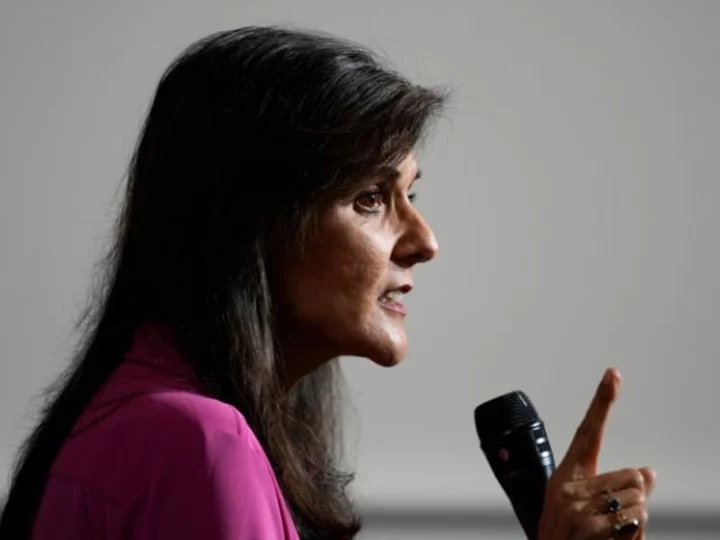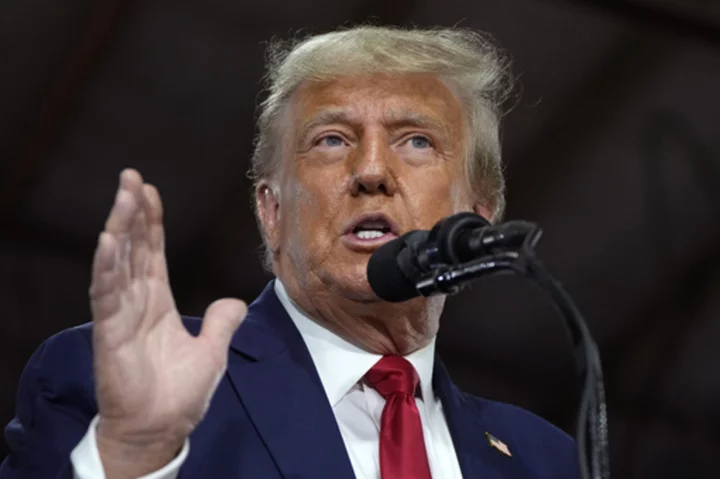Former South Carolina Gov. Nikki Haley entered the Republican primary in February with a call for "generational change." But her message has largely been drowned out by former President Donald Trump and Florida Gov. Ron DeSantis, who are dueling for support from the GOP's right-wing base.
On Sunday night, though, at a live CNN town hall in Iowa, Haley will have her clearest opportunity yet to distinguish herself from the growing Republican presidential field -- and make the case that she is both the best candidate to upend Trump in next year's primaries and then defeat President Joe Biden in the fall.
Haley's early poll numbers among Republicans have been meek. Like so many others now flooding the race, she tends to slot in with those currently receiving support in the single digits, laps behind Trump and DeSantis. A moderate, at least in the current context of the Republican Party, Haley is trying to formulate a coalition composed of the GOP's anti-Trump and Trump-fatigued voters along with a chunk of the former president's conservative base.
So far, she has come under some criticism for not providing clear answers on her own policy agenda and her attempts to balance her critiques of Trump -- and Trumpism -- with the fact that she served in his administration as the US ambassador to the United Nations.
Now, with the first round of primary debates on the horizon, Haley will have a chance to clarify her views and make her case to a national audience ahead of yet more campaign announcements this coming week, including expected entries by former Vice President Mike Pence and former New Jersey Gov. Chris Christie.
Here are four things to watch for:
What kind of abortion law does Haley want?
When asked about the most divisive topic in contemporary politics, Haley has repeatedly said her main goal is to find consensus on abortion.
Personally, she is unreservedly anti-abortion. But what that means in practice, and in a campaign where candidates are being pressed for specifics, has been harder to pin down. Recently, she endorsed a federal abortion ban -- while, at the same time warning that conservatives need to be real and admit that they do not, and likely will not, have the votes in Washington to make that happen.
"I'm not going to lie to the American people. Nothing's going to happen if we don't get 60 votes in the Senate. We're not even close to that on the Republican or Democratic side," Haley recently told CBS News. "Why try and divide people further?"
During her time as governor of the Palmetto State, Haley signed a 20-week abortion ban. That was, she has said, the most ambitious bill that could pass at the time. Late last month, Republican Gov. Henry McMaster, Haley's successor and a former lieutenant governor, signed a six-week ban, though a state judge has since temporarily blocked the new restrictions from going into effect.
Following Haley's comments to CBS News, Marjorie Dannenfelser, president of the anti-abortion Susan B. Anthony Pro-Life America, cast the former governor as a defeatist.
"The pro-life movement must have a nominee who will boldly advocate for this consensus, and as president will work tirelessly to gather the votes necessary in Congress," Dannenfelser said. "Dismissing this task as unrealistic is not acceptable."
How Haley answers the question this time out, and whether she is willing to offer more of a plan than an observation, will be instructive as to her view of the issue and its role in the campaign.
The elephants (not) in the room
Haley has so far sought to avoid any direct conflict with Trump, instead training her ire more directly on DeSantis and only criticizing the former president in vague terms.
"We're ready to move past the stale ideas and faded names of the past," Haley said in February. "And we are more than ready for a new generation to lead us into the future."
Haley also proposed a mental competency test for politicians over the age of 75 -- a group that, in the context of this campaign, includes only Trump and Biden, whom she at one point suggested was unlikely to live out a second term in office. As for DeSantis, she has mostly referred to him as a carbon copy of Trump.
In one her most-discussed campaign ads, called "A Choice, not an Echo," Haley's campaign portrayed DeSantis as an empty vessel and even highlighted what some have described as DeSantis' efforts to mimic Trump's hand gestures.
Mostly, though, she has railed against the refusal by DeSantis (and Trump, to a lesser extent) to commit to backing Ukraine as it fights against the invasion by Vladimir Putin's Russia.
Whether and to what extent she zeroes in on the issue, which has become a bone of contention between the GOP's establishment and MAGA wings, will say something about her campaign's strategy going forward.
Nikki Haley, culture warrior?
Haley has framed her decision to successfully push for the removal of the Confederate flag from the South Carolina state Capitol grounds as evidence of her ability to forge agreements from seemingly intractable debates.
But on the campaign trail, she has repeatedly tapped into the Republican backlash to transgender rights and other social and cultural divides.
"I'm running for president to renew an America that's proud and strong, not weak and woke," Haley said in a speech at the Conservative Political Action Conference in March. "Wokeness is a virus more dangerous than any pandemic, hands down."
Like her rivals, Haley has been less clear on what "woke" properly means -- a habit that even Trump now has criticized -- and taken to making personal attacks on transgender influencer Dylan Mulvaney, whose participation in an ad campaign for Bud Light beer infuriated right-wingers.
"Let me tell you something: I know that there are transgender people out there. That is not a transgender person. That is a guy dressing up like a girl making fun of women," Haley said of Mulvaney, misgendering the social media star, in a riff she's repeated before multiple audiences.
That line might play well with die-hard conservatives and activists, but polling -- and the 2022 election results -- suggests there's a broader base of Americans who might be less receptive. The question on Sunday night: How hard does she lean into this line of attack?
The future of Social Security and Medicare
The rise of populist politics within the GOP has further complicated establishment party talk of "entitlement reform" -- or long-term plans to cut public funding for popular programs such as Social Security and Medicare.
Combined with the fact that the aging Republican electorate is increasingly loath to support plans that could diminish their current or future benefits, what was once party dogma is now a third rail, even with many conservatives.
Haley's solution: Call for changing the retirement age for Americans currently in their 20s and limiting Social Security and Medicare benefits for wealthier Americans.
"What you would do is, for those in their 20s coming into the system, we would change the retirement age so that it matches life expectancy," she told Fox News in March.
Will Haley get more specific when pressed on the proposal? And how does she make the case given her party's recent flight from the issue? The answers, again, will set the stage for a busy week to come.









